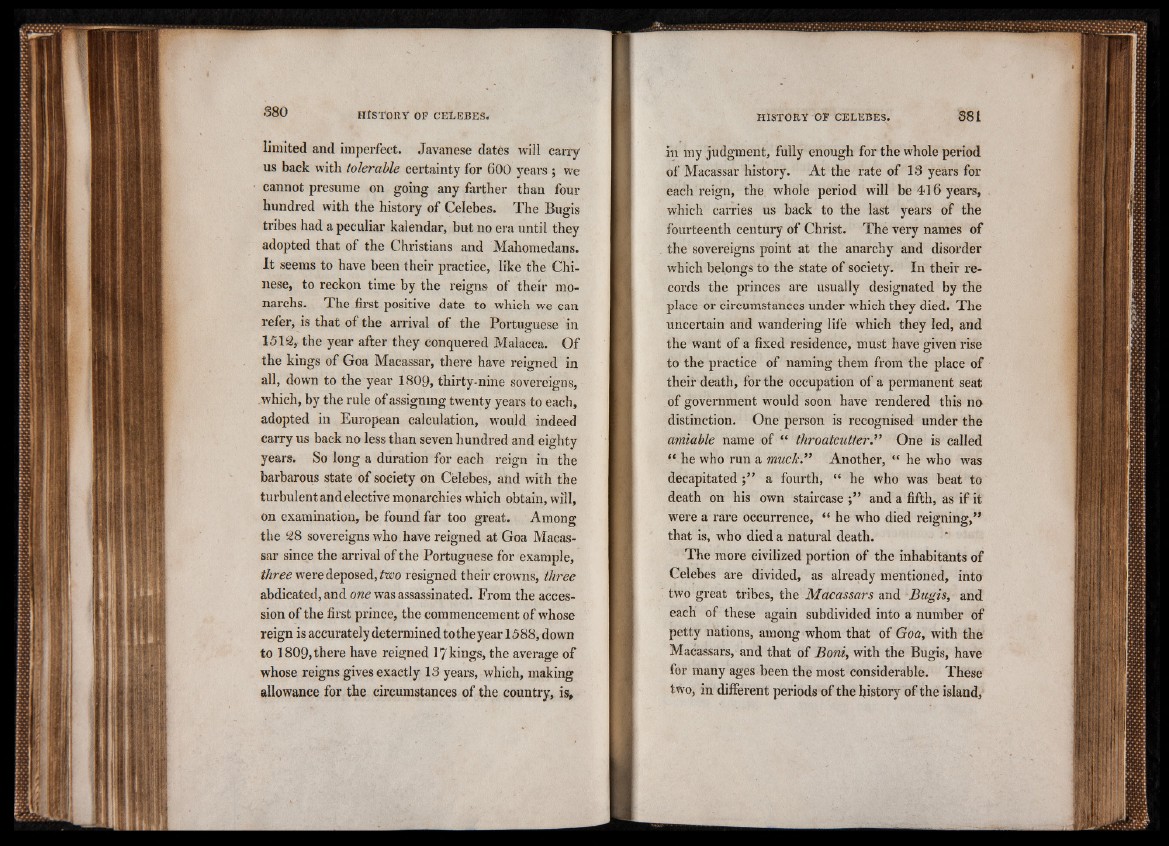
limited and imperfect. Javanese datés will carry
us back with tolerable certainty for 600 years ; we
cannot presume on going any farther than four
hundred with the history of Celebes. The Bugis
tribes had a peculiar kalendar, but no era until they
adopted that of the Christians and Mahomedans.
It seems to have been their practice, like the Chinese,
to reckon time by the reigns of their mo-
narchs. The first positive date to which we can
refer, is that of the arrival x of the PortugOuese in 1512, the year after they conquered Malacca. Of
the kings of Goa Macassar, there have reigned in
all, down to the year 1809, thirty-nine sovereigns,
which, by the rule of assigning twenty years to each,
adopted in European calculation, would indeed
carry us back no less than seven hundred and eighty
years. So long a duration for each reign in the
barbarous state of society on Celebes, and with the
turbulent and elective monarchies which obtain, will,
on examination, be found far too great. Among
the 28 sovereigns who have reigned at Goa Macassar
since the arrival of the Portuguese for example,
three were deposed, two resigned their crowns, three
abdicated, and one was assassinated. From the accession
of the first prince, the commencement of whose
reign is accurately determined to the year 1588, down
to 1809, there have reigned 17 kings, the average of
whose reigns gives exactly 13 years, which, making
allowance for the circumstances of the country, is,
in my judgment, fully enough for the whole period
of Macassar history. At the rate of 13 years for
each reign, the whole period will be 416 years,
which carries us back to the last years of the
fourteenth century of Christ. The very names of
the sovereigns point at the anarchy and disorder
which belongs to the state of society. In their records
the princes are usually designated by the
place or circumstances under which they died. The
uncertain and wandering life which they led, and
the want of a fixed residence, must have given rise
to the practice of naming them from the place of
their death, for the occupation of a permanent seat
of government would soon have rendered this no
distinction. One person is recognised under the
amiable name of “ throatcutter.” One is called
** he who run a muck.” Another, “ he who was
decapitated a fourth, “ he who was beat to
death on his own staircase j” and a fifth, as if it
were a rare occurrence, “ he who died reigning,”
that is, who died a natural death.
The more civilized portion of the inhabitants of
Celebes are divided, as already mentioned, into
two great tribes, the Macassars and Bugis, and
each of these again subdivided into a number of
petty nations, among whom that of Goa, with the
Macassars, and that of Boni, with the Bugis, have
for many ages been the most considerable. These
two, in different periods of the history of the island/